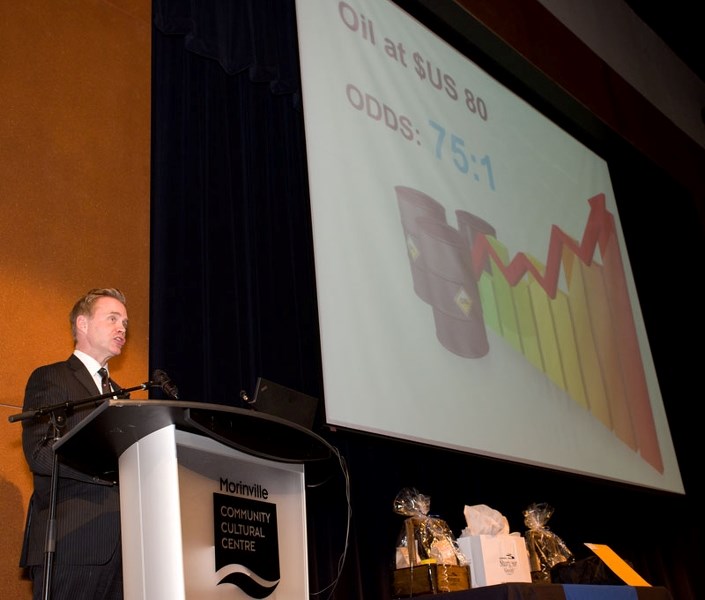Low oil prices will mean lower housing prices and more unemployment as this year rolls on, says a renowned provincial economist. But they will also lead to a more diverse economy.
ATB Financial senior economist Todd Hirsch was the keynote speaker Thursday at the 2016 State of the County Breakfast in Sturgeon County. About 120 dignitaries came to Morinville’s Community Cultural Centre to hear him speak.
Low oil prices are the main reason why Alberta’s economy is in the state it is now, and everyone is wondering when they’ll bounce back, Hirsch said.
It’s very unlikely that we’ll see $80 a barrel oil this year – he pegged the odds at 75:1 – as we’d need both a major rebound in the world’s economy and for all oil-producing nations to sharply curtail production, he said. But if everyone keeps flooding the market at current rates, there was maybe a five per cent chance that oil prices could plummet to $20 a barrel.
“We could in the future be in this situation.”
But it’s becoming physically impossible for OPEC nations to keep up their current pace, Hirsch said. Saudi Arabia is burning through its foreign reserves fast due to current oil prices, and Venezuela and Nigeria are at the point of economic and social collapse. He gave 3:1 odds that OPEC would slightly crank back its production this year, boosting oil to $50 to $55 a barrel.
“The bad news is $50 oil is still a very challenging price for most oil producers in this province,” he continued.
$42 oil made for rapid economic growth in Alberta back in 2004, but that growth was driven by cheap labour and high natural gas prices, Hirsch said. We don’t have either of those now, so don’t expect growth in the oil sector until oil prices hit $60 a barrel.
“These prices will bring stability back to the industry, but not growth yet.”
A bank collapse and stock crash in China could also scuttle our recovery, Hirsch said. While that nation’s government has a lot of tools available to prevent such an occurrence, he pegged the risk of a recession in China at about 6:1 (roughly a roll of a die) due to obvious problems in that nation’s banking and real estate sectors.
On the brighter side, it’s very unlikely (15:1 odds) that the Bank of Canada will hike interest rates anytime soon, Hirsch said – with national unemployment at 7.3 per cent and no real inflation (cauliflower and other imports have shot up in price but that’s due to the exchange rate and not rampant spending, he explained), the bank has no reason to touch the rates.
“Great news for people on variable-rate mortgages,” he noted – not so great if you’re saving money.
Hirsch said there was a pretty good chance (3:1 odds) that Alberta’s unemployment rate would hit eight per cent by year’s end and that the province would continue to see net migration of people out of Alberta – likely to B.C., which currently leads the nation in economic growth. Rising oil prices will mean we’re unlikely to see the double-digit unemployment rates of the 1980s, however.
More unemployment will mean lower labour costs, letting non-oil businesses scoop up top talent and office space, Hirsch said. This would help diversify Alberta’s economy.
St. Albert is fortunate in that it hasn’t been hit too hard by the oil slump in terms of direct job losses, said St. Albert and District Chamber of Commerce president Lynda Moffat, who was at Hirsch’s talk. But local businesses are still feeling the effects of those layoffs in the form of job insecurity and reduced consumer spending.
Moffat was skeptical that the oil slump would free up workers for other businesses as Hirsch suggested.
“People being laid off in one sector doesn’t necessarily mean they’re going to come and work in something else,” she said, and St. Albert was still seeing significant labour shortages in the hotel and hospitality sector. St. Albert also didn’t have large numbers of unemployed oil workers either.
Moffat said she hoped that the slump would encourage more young workers to go back to school to learn the skills needed to get jobs outside the oil sector.




